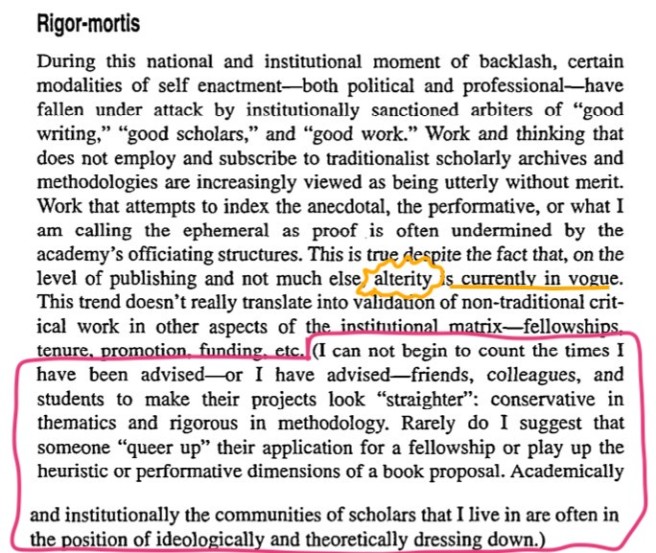
José Esteban Muñoz (1996) “Ephemera as Evidence: Introductory Notes to Queer Acts.” Women and Performance. Vol. 8, Iss. 2. pp7-8.
This week I was reading the above cited article by José Esteban Muñoz, when I was struck by the passage which I have excerpted and marked.
At the beginning of the coronavirus, I had this feeling that we were all in a stage play, wearing our costumes, holding our props, and speaking our lines from a well known script. All of a sudden that script, those words, vanished. And we were left holding ourselves in absurd postures, wearing costumes that did not fit us. At that initial moment of crisis, back in March, it felt strange, and often wrong, to be going through the motions. The starkness of crisis revealed the contours of intellectual structures and practices that we have irresistibly carried with us, but not consciously wished to do so. Cultures, traditions, structures of thought persist through repetitions, internalizations, citations; these are living and embodied practices. When the coronavirus revealed what it was we were actually doing — when the national uprisings in the fight for Black Lives underlined what we have been doing, what we are still doing — these were and are moments to reframe how we relate to ourselves and to each other. To return, then, to Muñoz’ words:
“This is true despite the fact that, on the level of publishing and not much else, alterity is currently in vogue… (I can not begin to count the times I have been advised—or I have advised—friends, colleagues, and students to make their projects look ‘straighter’: conservative in thematics and rigorous in methodology. Rarely do I suggest that someone ‘queer up’ their application for a fellowship or play up the heuristic or performative dimensions of a book proposal. Academically [p8] and institutionally the communities of scholars that I live in are often in the position of ideologically and theoretically dressing down.)”
In my field as much as any other, we are rooted in scholarly traditions and practices and proceed with these prior works as guides to our own thought, carrying these weights with us to load down and substantiate our own work. Yet, moments of rupture such as the ones we are currently experiencing reveal that there are other modes and practices which we desperately need. “Alterity” as a process seeks — not just “otherness”, and not just the “counter-cultural” — but, specifically, putting our eyes and our attention where it has not gone before. This means broadening our horizons, including texts and artefacts we haven’t considered before, citing the work of scholars outside of the gravitational pull of the citational traditions we currently have. But it also means examining our own interior commitments to structures which ultimately do not serve us.
Muñoz refers here to the process in which scholars and students learn to mute themselves, to form themselves into commodities based on the marketplace of scholarly desire which rewards presentations of comfortable sameness. Yet the image we’re supposed to be reflecting and performing is obsolete, artificial; the standards and shapes we replicate in our bodies and our thoughts are dependent upon eras in which we ourselves did not live, and which had values we no longer share. Muñoz wrote these words in 1996, but these processes are still happening around us and within us. Sara Ahmed wrote in Living a Feminist Life (2017: 4) about how feminist work must operate at the most interior level:
I began to realize what I already knew: that patriarchal reasoning goes all the way down, to the letter, to the bone. I had to find ways not to reproduce its grammar in what I said, in what I wrote; in what I did, in who I was.
We are living in rupture. Many things are shifting, opening, falling away. What stays and what goes? What inherited beliefs about scholarly and pedagogical practice — ideas and behaviours which never quite sat right with us in the first place — are we going to get rid of? What new words and new thoughts are we going to use?
One thought on “Note on José Esteban Muñoz’ “Ephemera as Evidence” // Letting go of things that do not serve us”
Comments are closed.